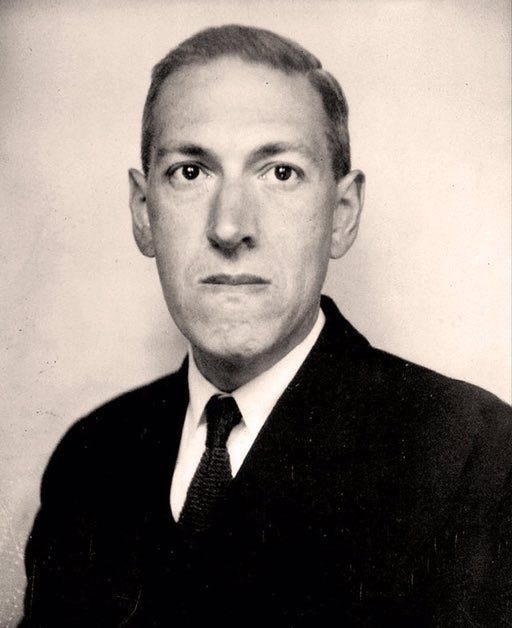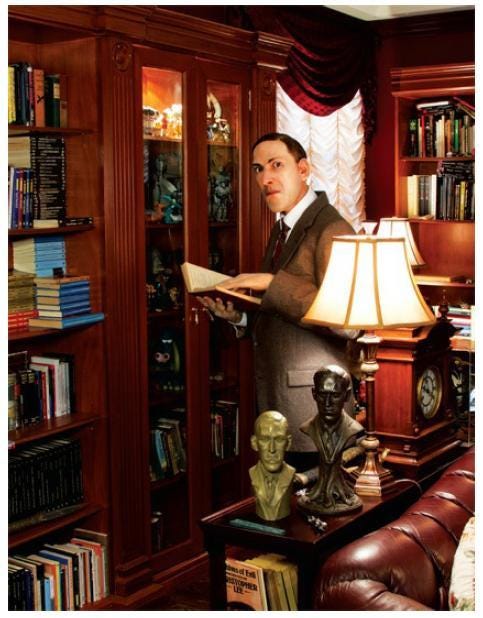(Some apologies to Bauhaus for the title)
Today (October 17) I woke to a chilly house. Outside it was 55F. Inside, 68F. It’s the first proper chill in my area. It got up past 80F last week. Today it was cold enough that I needed to turn on the heat. I don’t expect this will last. But it lets me turn my mind to chillier thoughts, stereotypical ‘fall’ type thoughts. Witches and vampires and werewolves and mad scientists and ghosts… yes, lots of ghosts. Ghosts in many forms have influenced American horror writing. One specter in particular still roams the back of our collective subconscious. And though that ghost is in the forefront of my mind and my writing, I still struggle to comprehend why.
HP Lovecraft wasn’t anyone special in his lifetime. He died poor and starving at age 46 of intestinal cancer, writing nonstop until the bitter end. A notorious bigot and xenophobe, especially towards black people, his fear and hatred of ‘the Other’ is reflected in every story he wrote. (For the sake of your mental health, don’t read The Horror at Red Hook.) There’s no evidence he ever truly abandoned these beliefs, though he did soften up as he aged. On top of that, some would say he wasn’t even a good writer. That’s not a kind thing to say - he wrote pulp, he didn’t need to be a good writer by our definition - but he himself said far worse.
Yet that shadow of his casts long over American pop culture. Cthulhu, his most famous creation from possibly his best written story, is everywhere: album covers and artwork, movies and youtube videos and adorable plushies. Arkham Asylum, yes from Batman, is named after the fictional town of Arkham, the location of Miskatonic University, both creations of his. His works inspired Stephen King. My favorite director, Guillermo Del Toro, has a life sized statue of the guy in his house.
(With all due respect Mr. Del Toro, what the fuck)
People smarter than I have discussed, analyzed, and debated the content of his work. I am not part of this admirable group but I’ve picked stuff up now and then. I linger on the edges of the greater community of creators of fiction and scholars of history, where Lovecraft is the center as he was in his circle of friends. He remains a nucleus of creativity and the ever-continuing pursuit of knowledge: about the man, his life, his inspirations, and how his work, and our interpretations of it, impacts us in the present day.
Every story is a mirror that reflects both author and reader. Lovecraft’s work reflected his fear of the ‘other’, his belief in a falling, fading western civilization, his awareness of humanity’s precarious place in the universe. Modern readers look into this mirror and see things differently, looking between the lines and finding their fears of inherited illnesses, mental health emergencies, even the joys and terrors of transitioning, staring back at them. And so, so much else, so much so I can’t even list them all.
Lovecraft is the one exception I’ve found to the belief that bigots can’t write good fiction. People whose hearts are full of hate cannot relate to others enough to create things that others can understand and relate to. Or so I’ve seen said many times. And yet, he is one of the most influential bigots in modern day pop culture.
Why?
Is it the separation of Lovecraft’s creations from his work? People who know nothing about Lovecraft, cosmic horror or weird fiction know about Cthulhu. People who have never read Lovecraft’s work or its many followers might’ve read The Stand, where King namedrops another of Lovecraft’s creations. And then there’s the 80s Re-animator movies, which has a hefty fanbase of its own, separate from Lovecraft’s mythos.
And yet, while all of these might have been gateways to some into the Lovecraft Mythos, you can’t separate his creations from his mindset. Once you know even a little bit about the man, you see the cracks letting in the light of reality into his work.
While the story of Lovecraft’s post-mortem fame is a tangled one, maybe the core of it can be found in Lovecraft’s life. Lovecraft, for all his flaws, had a lot of good friends. Frank Belknap Long and Robert E. Howard come to mind immediately, but there’s dozens more. Men and women alike, mostly white but a few Jewish people too (wife included), who he, in that usual way bigots do, made exceptions for. There was a Lovecraft Circle, at the center of this was Lovecraft himself. These were pulp writers who supported each other and helped each other best they could. Lovecraft felt deeply for these people. He visited them and wrote letters, traded ideas and helped with their stories, grieved when they died. Howard, the creator of the equally immortal Conan the Barbarian and the sword and sorcery genre, committed suicide, and Lovecraft deeply mourned his loss. Lovecraft felt all his emotions strongly, from what I’ve seen - love and hate, fear and affection.
And maybe that strong emotion is the key to his resonance in the modern day. If Lovecraft didn’t feel so strongly in his fears, would he have written his many famous (and other, infamous) stories? If he didn’t feel so strongly about his friendships, allowing others to use his creations, would we be continuing the practice? We have so much to thank, gratefully or grudgingly, Lovecraft for. Video games, TTRPGS, podcasts, movies, and so many books, countless wonderful books, involving things he couldn’t have imagined, and might not have approved of. And that’s without getting into the cosmic horror that doesn’t involve the Mythos. That’s without getting into our attitudes about horror and how he’s changed it.
The story of how Lovecraft and his Mythos became so popular is well documented. But I’m a why kind of guy. It’s a question I have no answers for, and neither does he. He’s dead, after all. And he probably wouldn’t have liked me much if he’d known me. But there’s a weird form of afterlife he’s acquired. Never mind his legacy, we haven’t even touched the many fictional interpretations of the guy. That odd tendency is something I find especially bizarre and a bit fascinating. Much like an eldritch creature, I guess.
So much to talk about in the life of one man. And there’s going to be plenty more in the future who deserve this treatment. I hope they get it.
Until then, when it comes to Lovecraft, all we can do is analyze, discuss, debate, and recreate. Remake, redesign, re-establish, rebirth his creations, over and over again, each time living our personal fears through his work. His shadow would not be so long without the people who came after him. It's the work of ST Joshi, Chaosium, the HP Lovecraft Historical Society, Deep Cuts in a Lovecraftian Vein, and so many others I can’t list that keeps his legacy breathing.
And maybe I too, will soon be one of those fiction writers who add my name to that long list of people who put their signature on the Mythos. I’m hoping to have my novelette, The Darkness in Old Bellblack, self-published later this month, or early November. Keep your eyes open. And keep reading! (May I recommend The Ballad of Black Tom by Victor LaVelle or Providence Girls by Morgan Dante to whet your appetites?)
Enjoy this post? Subscribe for more! Or send me a tip over on Ko-Fi to help fund my writing. As a beginning author, I need all the help I can get!






I honestly couldn’t have put it better myself. It’s hard to grapple with the dark legacies of people of such major influence on a genre—on a culture. I personally haven’t read any Lovecraft myself, but read many works influenced by him and am fascinated by the cosmic horror he helped pioneer. Shame he was such a bigot. I’m of the opinion that we have to grapple with both truths simultaneously, not reject one in light of the other as you so eloquently put.
I enjoyed reading this! Thanks for sharing